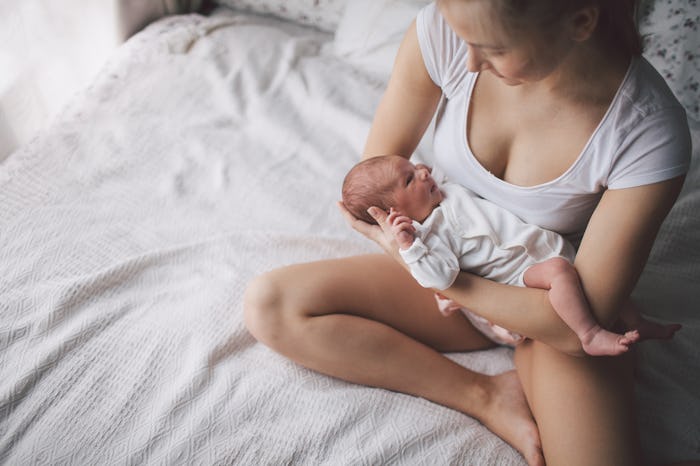Your first week postpartum is going to be one major thing: a blur. Seriously, I can barely remember those first seven days after giving birth to my daughter, but I do remember some big changes with my breasts. Knowing what'll happen to your boobs your first week postpartum is a pretty good idea, so that when you start leaking milk while you're in the first shower home, you don't panic and think all your milk is draining away. (Oh, the things you're going to panic about during that first week.)
The good news is, it's all normal. Although it may feel like you're in an episode of The Twilight Zone to spontaneously leak milk from the giant boulders on your chest, it's really OK. You're not turning into an alien and, eventually, your breasts won't feel like foreign objects strapped to you; they'll feel like your boobs again. But the first week postpartum is wrought with stress, hormonal shifts that make you feel legit crazy, and a lot of fatigue. It's no wonder that boob changes can induce extra panic.
And man, are there some changes. For one thing, your breasts can become really engorged, according to International Board Certified Lactation Consultant (IBCLC) Kate Fresso. "Most people are familiar with the supply and demand aspect of milk production, but what they don't know is that supply and demand doesn't happen until a few months into breastfeeding," Fresso tells Romper. "In the beginning, your supply is driven by hormones rather than the demand for milk. Your body starts making milk at around 20 weeks gestation and after you deliver the placenta, there is a hormone shift. Progesterone drops significantly and prolactin rises significantly. This is what tells your body, 'OK, time to crank up the milk factory' and is called Lactogenesis II. Most people know it as your milk coming in."
Fresso says this is also accompanied by varying degrees of swelling and/or engorgement. "If you had a long labor with lots of interventions (like an epidural), you will likely end up with some extra swelling as well, since you would have had lots of IV fluids," she says. "Engorgement is normal, and it should happen around three to five days postpartum. If it doesn't, and your baby isn't gaining weight or pooping, there may be an issue and you should contact an IBCLC right away."
Yay for giant boobs, right? Except they aren't so fun when they're sore. Usually, after you breastfeed for a few weeks, it's not a painful process. But that first week postpartum can be a little difficult. "I hear professionals say lots of different things about pain," Fresso says. "Some people say breastfeeding shouldn't hurt at all, but my personal opinion on it is this: you are going from never, or hardly ever, using this body part to using it eight to ten times a day. Any body part that goes through that is going to experience some soreness." Fresso does note, however, that if you're feeling toe curling pain that brings tears to your eyes, pain that lasts through the entire feeding, wounds or you're bleeding, it could be a sign something is off and that you need to reach out to an IBCLC.
According to Fresso, some other early changes can include blue veins popping up on your breasts as there's an increased flow of blood and oxygen, a tingling feeling as your milk lets down, and leaking, which can happen because of the looser muscles in your breast. But feeling your let-down and leaking can also not happen during the first week postpartum, which is also totally normal. Fresso notes that your breasts leaking has less to do with your milk supply than the musculature of your breasts and not feeling the let-down reflex doesn't mean your milk isn't there. As long as your baby is eating well and gaining weight, your breasts are doing just fine.
If you're worried about coping with all of the changes of new motherhood plus breastfeeding, it's understandable. Take the time before you deliver to find a prenatal breastfeeding class and make contact with an IBCLC so if you need help or support, you have someone you trust to step in. Breastfeeding is hard, but that first week postpartum is hard enough without feeding your baby. Just remember to be kind to yourself and your breasts, and to stock up on nipple pads. You might need them.
